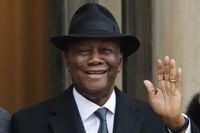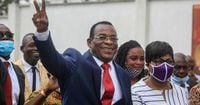Ivory Coast is gearing up for a tense and potentially volatile election season as President Alassane Ouattara formally announced his bid for a fourth term in office. This decision, made public on July 29, 2025, has ignited fierce opposition and raised alarms about the country’s democratic future, especially given the sidelining of key rivals and the constitutional changes that paved the way for Ouattara’s extended rule.
Ouattara, 83, who has been in power since 2011, declared his candidacy in a televised address, asserting, “I am a candidate, because the constitution allows me to seek another term, and my health allows it.” His justification for seeking another term hinges on the “unprecedented security, economic, and monetary challenges” Ivory Coast currently faces. The president pointed to growing terrorist threats in the sub-region and international economic uncertainties as reasons why experienced leadership is crucial at this juncture.
This announcement follows a controversial constitutional amendment in 2016, when Ouattara reset presidential term limits to allow himself a third term in 2020. Now, by running for a fourth term, he is pushing the boundaries of the political framework yet again. According to Pascal Affi N’Guessan, former prime minister and leader of the Ivorian Popular Front Party, this move flies in the face of the original constitutional intent. “When it was originally adopted, the leaders and drafters of the Constitution were clear that one could not serve more than two terms,” N’Guessan said.
Opposition leaders have reacted angrily to Ouattara’s decision. N’Guessan criticized the president’s rationale, recalling that Ouattara himself had previously stated a willingness to “pass the torch to the next generation.” He questioned how Ouattara could reconcile his 2020 bid, justified by exceptional circumstances, with the current pursuit of a fourth term. The opposition’s frustration is compounded by the barring of two prominent figures: Tidjane Thiam, leader of the Democratic Party of Ivory Coast (PDCI), and former President Laurent Gbagbo, head of the African People's Party of Ivory Coast (PPACI). Both have been excluded from the electoral list, with Thiam disqualified on the grounds of dual French citizenship at the time he declared his candidacy, despite later renouncing his French nationality. These exclusions have led to protests and calls for their reinstatement.
“Until the entire opposition mobilises to ensure that the Independent Electoral Commission is more transparent and more balanced, so that the electoral code is revised, the electoral roll is cleaned up, and all these issues are resolved, there is no prospect of peaceful elections,” N’Guessan warned. He also accused Ouattara of deepening divisions within Ivory Coast, imprisoning opponents, and damaging relations with neighboring countries. “He’s truly become a problem for Côte d'Ivoire,” N’Guessan said, emphasizing the need for unity, stability, and renewed international engagement.
Analysts view Ouattara’s fourth-term bid as part of a troubling regional trend. Ibrahim Anoba, an Africa affairs analyst at the Atlas Network, cautioned that this move risks a return to “old guard dictator rule” in West Africa, a region already grappling with democratic backsliding. Anoba noted that Ouattara’s announcement came after the disqualification of most of his prominent rivals, making the election a near-formality for the incumbent.
After removing term limits in 2016, Ouattara joins other long-serving leaders in West and Central Africa seeking to extend their rule through constitutional changes. Examples include Togo’s Faure Gnassingbé, who shifted to a parliamentary system with an all-powerful role; Cameroon’s Paul Biya, in power since 1982 and eyeing an eighth term; and Central African Republic’s Faustin Touadera, pursuing a contested third term. This pattern has coincided with a surge in military coups—eight recorded since 2020—often justified by the military as necessary responses to flawed democratic processes.
Opposition protests against Ouattara’s candidacy have been suppressed, with several protesters arrested on charges of disturbing public order. “We might be sliding back to that era of old men, old guard dictator rule in West Africa because of the attitude of the military and equally the civilian rulers,” Anoba said. This crackdown on dissent threatens to fuel further unrest among Ivorians, particularly the youth, who have increasingly voiced their demand for change amid economic hardships and security concerns.
Beverly Ochieng, a senior analyst at Control Risks, described the elections across West and Central Africa as “status-quo elections” that reinforce incumbents’ authority while sidelining opposition parties. She explained that many leaders are willing to use constitutional and transitional means to prolong their stay in power, blurring the lines between democratic governance and authoritarian rule.
Despite these challenges, Ivory Coast has maintained a reputation as one of Africa’s most stable democracies, particularly after the devastating civil wars that marred its recent past. Ouattara’s economic policies have helped establish the country as a major African economic power. However, analysts warn that beneath this veneer of stability lies a tight grip on government institutions that hampers genuine political competition.
The country’s electoral history is marked by violence, most notably in 2011 when then-leader Laurent Gbagbo refused to concede defeat, leading to clashes that killed an estimated 3,000 people. Given this history and the current political climate, concerns are mounting about the potential for renewed violence following the October 25, 2025, presidential elections.
Economically, Ivory Coast faces significant headwinds. It is the world’s leading cocoa beans exporter, producing over a third of the global supply, but the sector is vulnerable to climate-related disruptions and U.S. tariffs. Security-wise, the spread of terrorist groups linked to al-Qaida and the Islamic State from the Sahel region into West African coastal states, including Ivory Coast, has heightened fears about the country’s stability.
Ouattara’s decision to run again, therefore, is framed as a necessity to navigate these multifaceted challenges. Yet, with opposition leaders sidelined and protests suppressed, the democratic legitimacy of the upcoming election is in question. The path ahead for Ivory Coast is fraught with uncertainty, as it balances the desire for stability against the risks of entrenched power and political exclusion.
As the election draws near, all eyes will be on Ivory Coast to see whether it can uphold its democratic traditions or slide further into the regional trend of prolonged incumbency and political unrest. The stakes are high, not only for Ivory Coast but for the broader West African region, where the future of democracy hangs in the balance.



